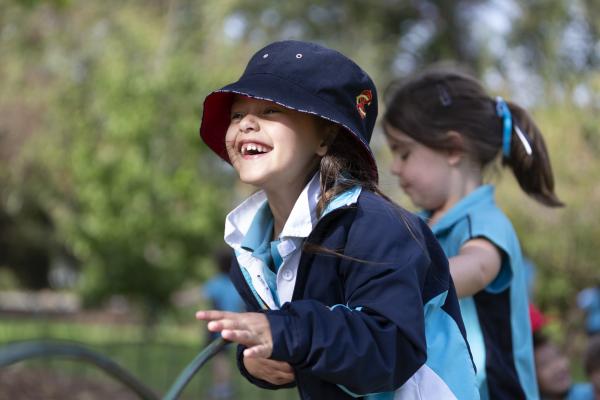
A child’s first day at school is a unique milestone in a parent’s journey. It’s a time of excitement for what lies ahead, sometimes tinged with worry or a hint of sadness about separation and the transition to this new phase of life.
As parents we want our children to thrive, so how can we best prepare them for starting school?
Many parents focus on academics, especially early literacy and numeracy. But while familiarity with letters and numbers can be advantageous, Sacré Coeur’s Head of Junior School Janine Hogan says these are rarely the keys to successful early schooling.
“Socialisation is what matters,” said Ms Hogan. “It’s about feeling happy in one’s own skin and being able to engage with others and in activities outside of the family environment.”
“The more comfortable a student is operating as part of a larger group, the more they’re open to play and learning. And play-based learning is what it’s all about.”
So while there’s no need for students to arrive knowing the whole alphabet, being able to recognise their own names can be helpful. A child feels a sense of pride when they spot their name on a book, jumper or locker, and this encourages independence.
“The children who settle the most quickly are the ones who are feeling, ‘oh, this is my place, and I’m in charge here and I can do some things for myself’,” said Ms Hogan. “Having them feeling capable and self-sufficient is key.”
The school transition can be easy for some and more difficult for others, and there are many things parents and educators can do to make the process as seamless as possible. Establishing routines in this new environment builds predictability and gives children a sense of security and control, which can help an unsettled child adjust.
Schools like Sacré Coeur communicate regularly with parents and welcome them on-site to make individual plans to support children, and educators ensure there are interesting, hands-on activities for students to engage with as soon as they arrive each morning.
Ms Hogan says students become primed to learn once they begin to feel like the school is theirs to explore.
In terms of encouraging literacy development, reading to a child regularly is perhaps the single best thing a parent can do. Not only does it stimulate imagination, it instils a sense of wonder around books and stories, and these determine the way young children engage with literacy tasks at school.
“Their rate of progress is extraordinary,” she said. “It’s fascinating to see and hear your young child learn to sound words out, to write initial letters in the phase of role play writing and then begin to space letters apart to represent words.”
“It’s really special to be part of it. To be reading with your child at home and to witness them gradually seeing themselves as a reader is quite amazing.”







